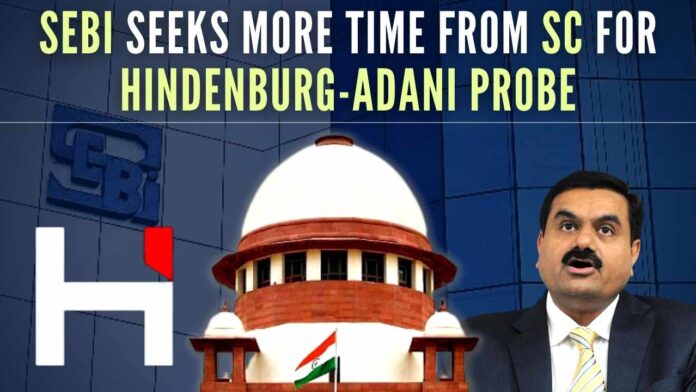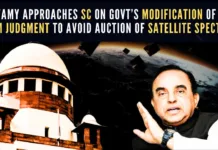
SEBI seeks 6-month extension from SC to probe Adani Group on Hindenburg allegations
On Saturday, the Securities and Exchange Board of India (SEBI) moved the Supreme Court seeking a six-month extension to complete its probe into the Hindenburg allegations of “stock manipulation” by the Adani Group.
SEBI, in an application moved in the apex court, said: “Applicant/ SEBI most respectfully submits that keeping in view the forgoing circumstances, it would take further time to arrive at verified findings and conclude the investigation… for ascertaining possible violations related to mis-representation of financials, circumvention of regulations and/ or fraudulent nature of transactions in respect of 12 suspicious transactions… given the complexity of the matter, SEBI in the normal course would take at least 15 months for completion of the investigation of these transactions, but is making all reasonable endeavors to conclude the same within six months.”
SEBI submitted that in order to conduct a proper investigation and arrive at verified findings, it would be just, expedient, and in the interest of justice that the apex court extends the time to conclude the investigations by at least six months.
The apex court, in an order passed on March 2, had set a deadline to submit a status report on May 2, while asking SEBI to expeditiously conclude the investigation and file a status report.
SEBI said that replies and documents/ information received from the companies would require reconfirmation and reconciliation, as well as independent verification.
“The applicant/ SEBI also respectfully submits that in respect of the investigation/ examination relating to 12 suspicious transactions, prima facie it is noted that these transactions are complex and have many sub-transactions and a rigorous investigation of these transactions would require collation of data/ information from various sources along with detailed analysis, including verification of submissions made by the companies,” the application said.
It also said that this analysis would include a detailed examination of the following: Financial statements of listed entities and unlisted entities; financial statements of offshore entities involved in the transactions; disclosures filed with the stock exchanges including annual reports, balance sheets, quarterly financial statements, and other event-based disclosures; minutes of the meetings of their board of directors and audit committee, wherever applicable; bank statements of the concerned entities for the relevant period (the allegations span over a 10 year period); connections/ relations are amongst entities, both domestic and overseas; and, contracts and agreements, if any, entered between the entities along with other supporting documents.
“The applicant/ SEBI further submits that this process of seeking bank statements from the offshore banks would entail taking assistance from offshore regulators, which may be time-consuming and challenging. The applicant/ SEBI submits that only thereafter, the analysis would have to be conducted for the voluminous bank statements,” said the application.
SEBI said that as is the case in most investigations, every layer of information received often leads to further layers of information that are required, sought, obtained, and analyzed and this process is particularly time-consuming where there is a complex web of transactions.
In its order passed on March 2, the Supreme Court announced an expert committee to examine India’s investor protection framework in response to petitions following the crash in Adani Group securities against the backdrop of the Hindenburg Research report released in January. The Adani Group rejected the report.
The apex court had said: “In order to protect Indian investors against the volatility of the kind which has been witnessed in the recent past, we are of the view that it is appropriate to constitute an expert committee for the assessment of the extant regulatory framework and for making recommendations to strengthen it. We hereby constitute a committee consisting of the following members: O P Bhatt, Justice J P Devadhar (retired), K V Kamath, Nandan Nilekani, and Somashekhar Sundaresan.”
The remit of the committee includes – providing an overall assessment of the situation including the relevant causal factors which have led to the volatility in the securities market in the recent past; suggesting measures to strengthen investor awareness; investigating whether there has been a regulatory failure in dealing with the alleged contravention of laws pertaining to the securities market in relation to the Adani Group or other companies; and, to suggest measures to (i) strengthen the statutory and/or regulatory framework, and (ii) secure compliance with the existing framework for the protection of investors.
The apex court had noted that it appears that SEBI is seized of the investigation into the allegations levelled against the Adani Group companies.
“SEBI has not expressly referred to an investigation into the alleged violation of the Securities Contracts (Regulation) Rules 1957 which provide for the maintenance of minimum public shareholding in a public limited company. Similarly, there may be various other allegations that SEBI must include in its investigation,” it said.
[With Inputs from IANS]
PGurus is now on Telegram. Click here to join our channel and stay updated with all the latest news and views
For all the latest updates, download PGurus App.
- UP Special Task Force arrests Mahadev app India head, his associate from Lucknow - April 26, 2024
- CBI raids Sheikh Shahjahan’s relative in Sandeshkhali; seizes huge cache of arms, explosives - April 26, 2024
- Will ‘exit India’ if forced to break encryption: WhatsApp to Delhi High Court - April 26, 2024











Babri masjid case investigation by Liberhan commission took 17 years to submit report ….SEBI should inspiration to submit a report.
Even Ved Vyas did not taken so many years to write all Puranas